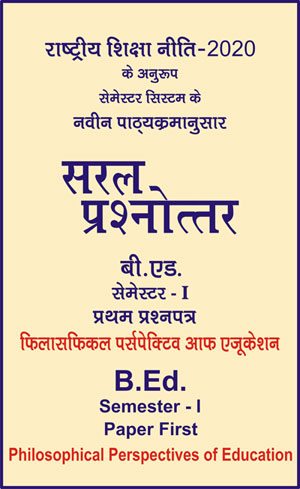|
बी एड - एम एड >> बी.एड. सेमेस्टर-1 प्रश्नपत्र-I - फिलासफिकल पर्सपेक्टिव आफ एजुकेशन बी.एड. सेमेस्टर-1 प्रश्नपत्र-I - फिलासफिकल पर्सपेक्टिव आफ एजुकेशनसरल प्रश्नोत्तर समूह
|
|
|||||||
बी.एड. सेमेस्टर-1 प्रश्नपत्र-I - फिलासफिकल पर्सपेक्टिव आफ एजुकेशन (अंग्रेजी भाषा में)
Question- Write a short note on Idealist Concept of Discipline.
Or
Discipline is a part of the question concerning educational method of idealism. Submit your comment.
Or
“Idealists are in the complete opposition to the naturalists”. The later believe in complete freedom while the former insist on discipline.
Answer -
Idealist Concept of Discipline
Discipline is a part of educational methods related to the concept of idealism. The concept of idealism firmly believe in the theory of discipline. The only gain of truth in the assumption is that idealists. Stress the value of discipline as a part of educative process. The idealist concept of discipline has following characteristics which depicts idealism as a part of the concept.
Characteristics of discipline of idealist concept :
- Idealists interpret discipline as being based on independence.
- Rigorous discipline in never accepted by the idealists.
- They trust in the theory of self-discipline.
- Education basically aims at training the child in true independence.
- It stresses that child is independent by birth.
- Through the medium of education, the individual can break the chains which bind him at birth.
- The educator must develop in his educands the capability of reasoning.
- Idealists do not favour the notion of allowing the child to roam free of any restraint but prefer to guide his freedom.
- The child’s activities are controlled in the school.
- Physical punishment and external restraints are not the methods of achieving education.
- It stresses on developing the qualities of self-resignation, obedience, humanity, politeness, etc.
- Idealists, therefore, believe in the efficacy of discipline through influence and impression and not through fear and coercion.
Conclusion : But, discipline can be created among the educands only when the educators themselves create and present good models of discipline. Their own conduct and behaviour should be conditioned by a knowledge of the child’s interests and inclinations. In their own behaviour, they must present the highest ideal of self-discipline, for only then can any discipline be expected from the educand. Idealists have criticised the establishment of discipline through threats, repression and punishment. They believe that the entire natural, social and spiritual environment in which the child lives, should be fashioned in such a way that it should encourage the desire for self-discipline in the child. Plato believed that the child in the school is restrained with the intention that he may be granted liberty gradually as he develops higher. As the individual develops to a level of higher responsibility, he should be granted successively more liberty.
|
|||||

 i
i 










